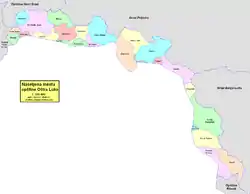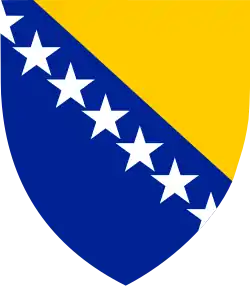Oštra Luka
Oštra Luka (Serbian Cyrillic: Оштра Лука) is a village and a municipality located in Republika Srpska, an entity of Bosnia and Herzegovina. As of 2013, the municipality has a population of 2,786 inhabitants, with 782 in Oštra Luka itself.[1]
Oštra Luka
Оштра Лука | |
|---|---|
Village and municipality | |
 Main street in Oštra Luka | |
 Location of Oštra Luka within Bosnia and Herzegovina | |
 | |
| Coordinates: 44°51′17″N 16°40′51″E | |
| Country | |
| Entity | |
| Government | |
| • Mayor | Drena Kuridža (SNSD) |
| Area | |
| • Total | 204.91 km2 (79.12 sq mi) |
| Population (2013) | |
| • Total | 2,786 |
| • Density | 14/km2 (35/sq mi) |
| Time zone | UTC+1 (CET) |
| • Summer (DST) | UTC+2 (CEST) |
| Area code(s) | 52 |
| Website | www |
The municipality is situated in the northwestern part of the Republika Srpska and the central part of the Bosanska Krajina region. It was previously known as Srpski Sanski Most (Српски Сански Мост, "Serbian Sanski Most") and was formed after the Dayton Agreement from part of the pre-war municipality of Sanski Most (the other part of the pre-war municipality is now in the entity of Federation of Bosnia and Herzegovina).
Geography
The municipality is located between the municipalities of Novi Grad and Prijedor in the north, Banja Luka in the east, Ribnik in the south, Sanski Most in the south and west, and Bosanska Krupa in the west.
Demographics
.jpg.webp)
Population
| Population of settlements – Oštra Luka municipality | |||||
|---|---|---|---|---|---|
| Settlement | 1971. | 1981. | 1991. | 2013. | |
| Total | 2,786 | 2,786 | |||
| 1 | Donja Kozica | 225 | |||
| 2 | Koprivna | 524 | |||
| 3 | Oštra Luka | 759 | 867 | 838 | 817 |
| 4 | Usorci | 434 | |||
Ethnic composition
| Ethnic composition – Oštra Luka | |||||||
|---|---|---|---|---|---|---|---|
| 2013. | 1991. | 1981. | 1971. | ||||
| Total | 782 (100,0%) | 838 (100,0%) | 867 (100,0%) | 759 (100,0%) | |||
| Serbs | 778 (92,84%) | 557 (64,24%) | 743 (97,89%) | ||||
| Croats | 32 (3,819%) | 28 (3,230%) | 8 (1,054%) | ||||
| Yugoslavs | 17 (2,029%) | 252 (29,07%) | 3 (0,395%) | ||||
| Bosniaks | 7 (0,835%) | 10 (1,153%) | 4 (0,527%) | ||||
| Others | 4 (0,477%) | 20 (2,307%) | 1 (0,132%) | ||||
| Ethnic composition – Oštra Luka municipality | |||||||
|---|---|---|---|---|---|---|---|
| 2013. | 1991. | ||||||
| Total | 2,786 (100,0%) | 2,117 (100,0%) | |||||
| Serbs | 2,580 (92,61%) | 1,407 (66,46%) | |||||
| Croats | 160 (5,743%) | 401 (18,94%) | |||||
| Bosniaks | 23 (0,826%) | 261 (12,33%) | |||||
| Others | 23 (0,826%) | 16 (0,756%) | |||||
| Yugoslavs | 32 (1,512%) | ||||||
References
- "B&H 2013 census - Oštra Luka Municipality". Retrieved August 31, 2020.
